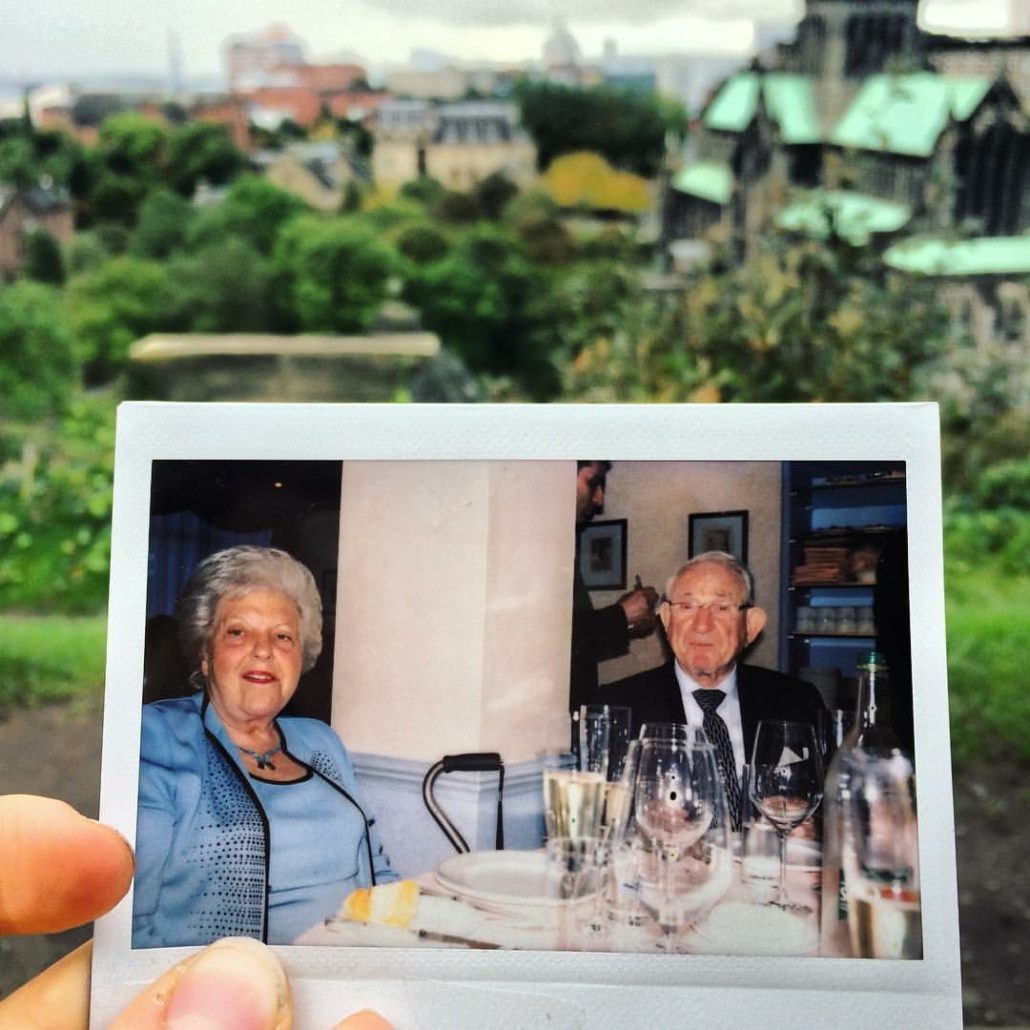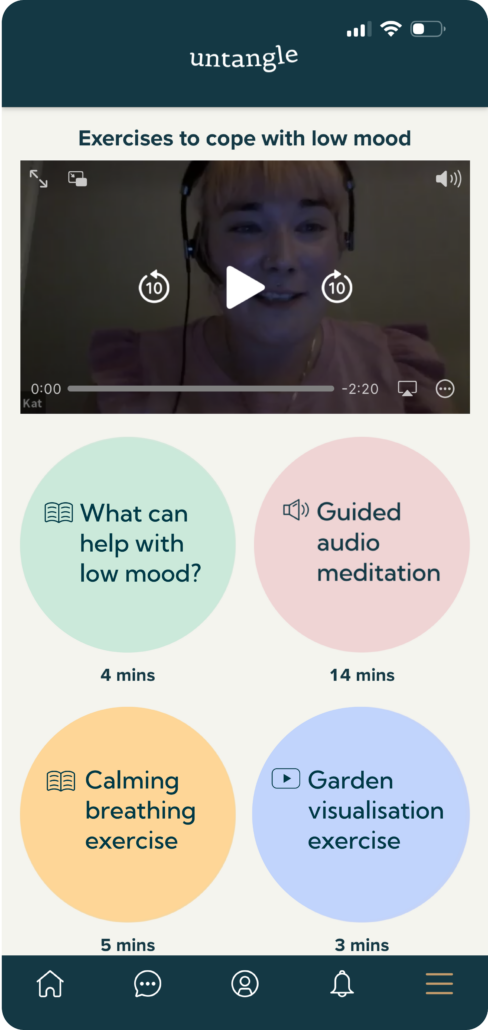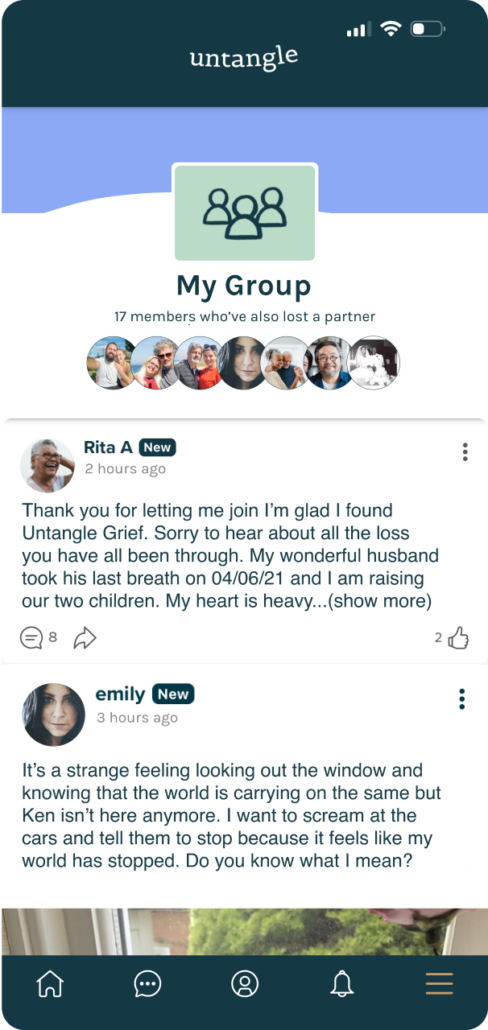 248
248  8 mins
8 mins Death is inevitable, an inseparable part of life. But when confronted with someone’s passing, it feels like we are never quite prepared. Whether it’s the emotional impact of grief or all the concrete, practical things we need to do, the event of someone passing can feel disorienting and complicated.
When Emily Cummin lost her grandad, she had to pull together to help her family. It was a confusing time, and she couldn’t quite understand why there wasn’t anywhere to go to find the appropriate support. So, she founded Untangle, a resource app, a safe space, and a community that “Holds your hand through all the challenges that come with a bereavement”.
During our discussion, we dissected the taboo subject of death. We also talked about how creating a space where death and grieving can be discussed openly benefits our mental wellbeing and positively impacts the energy, time and money people spend on dealing with these difficult moments of life. Untangle gives insight into the practicalities of grief and offers a kind of support that can also save lives.

Photograph of Emily’s grandparents
Thank you for joining us today to talk about Untangle. Could you start off by telling me how you started Untangle?
It all started about 6 years ago when my Grandpa Harold died. I was very close to him. He died on his 60th wedding anniversary. I helped my Mum and Grandma sort out everything when he passed. It was really tough. It took a lot of time and it was a confusing time. I was grieving, my Mum was grieving, and a lot was going on.
My professional background is in tech, doing business strategy. So I asked myself, “Why aren’t there solutions for these moments in life?” This is a problem that everyone is going to experience at some time. I sat on it for a while, and about two years ago, I started setting up Untangle.
The aim was to help families that are going through what I went through. I wanted to make it easier to take less time and cost less money. We can’t get rid of grief, but we can definitely help people with the admin and support them to let them know that they are not alone.
That’s an incredible idea! And it is indeed tough to find the correct information when someone passes. To get a little personal, I experienced someone passing not long ago, and it was hard to find information on what to do next. I would Google information, but it wasn’t always clear or straightforward.
There are about a hundred thousand monthly searches on Google for “What do I do when someone dies?” That is the first question for most people. Very few of us know because we don’t think about it until it happens.
When you go online, there is a lot of information. Not all of it is applicable, and it’s usually written in a heartless way. I wanted to help people by working out the steps they need to take when someone in their life dies, to give them a list of things they can do week-by-week, and give them emotional support throughout.
We have a community they can chat with and a team of experts who are there to help.
That sounds very useful and practical! Can you talk about the support you provide and how you provide it? How does it all work?
Untangle is an app. In essence, we do three things. Firstly, we guide you through the process. We also have experts and a team available to chat if you get stuck at any point. Lastly, we have a community that is there to support you and share the experience of grief.
We offer chat, video and sometimes in-person support groups based on who you’ve lost and how you’ve lost them. And, of course, we have moderators to safeguard the community.
There’s also a chat helpline with our team who answer questions such as “How do I fill out a form?” or “Am I entitled to time off work?” and “I need to start packing up my deceased mom’s house, and I don’t know where to start.”
Untangle also offers a plan with articles and videos with experts that explain all of the steps with topics such as “What do you do in your first week?”, “How do you plan a funeral?”, “How do you emotionally prepare for a funeral?”, “How to write a eulogy?”, “How do you pay for a funeral?”.
We want to acknowledge all the practical and emotional challenges that come with someone dying.
You launched your platform back in 2020. That must have been quite an experience. Death was being mediatized daily, on a global scale, at the time. It was a time when a platform like Untangle was the most needed. Could you share your experience with that?
I was working on Untangle before the pandemic. I had started a couple of months before Covid hit the UK. I remember as we were going into lockdown in London, I received calls from advisors and realized that many people were sadly going to die.
I felt this real sense of responsibility because I was developing something to help with that exact need. I wanted to move 10 times faster. We made a handbook on “what to do when someone dies”, and we had to update it repeatedly because the laws were constantly changing in response to the pandemic. We tried to evolve in response to the pandemic and update the information in real time. Sign-ups to Untangle were increasing 300% from month to month.
At that point, Untangle was just me, and I didn’t have any funding. It was a strange moment because building something like this takes time, and you know the expression, “it’s a marathon, not a sprint”. Well, because of the pandemic, I was trying to sprint until I realized I couldn’t do everything at once. I decided to start by building the support community and then add the practical guides.
A few months after the pandemic hit, we won an “Innovate UK” grant, which was incredibly helpful to develop Untangle.
The difficult thing about the pandemic was that not only were there many bereavements, but the lockdown brought a new set of challenges. You couldn’t say goodbye to your loved ones when they died, you couldn’t have a proper funeral and ceremony and all the support structures like seeing your friends were gone. People were stuck at home with their grief. We saw a lot of “secondary losses” (Editor’s note: losses related to financial security, a sense of self or purpose or loss of a support system). Additionally, many people who experienced bereavement years earlier were suddenly stuck at home with their thoughts. Grief came flooding through, making the pandemic an extra “griefy” time.

Screenshot of the Untangle App’s wellness tools
Grief is such an unexplored part of life. And when you are experiencing it, it can seem like it will never quite go away. It’s also been my experience that when someone in my life passes, it conjures all the previous losses that I’ve had. How do you tackle these “secondary losses” you were talking about with the people in your community?
Often, we have people joining Untangle because they’ve recently had a loss, and they share much more about a loss that happened 20 years ago. Because grief brings on grief, you never move on from grief. You learn to live with it. Many people deal with unresolved grief. They will say that they just “got on with life”. Maybe someone loses a partner, and they have kids. As a sole earner, they are focused on surviving and there is little space for grief. Actually, this was my response to my Grandpa dying. I was helping my mom, and I went into survival mode. It took some time for the grief to come out.
I think what can feel very isolating about grief is that it’s unpredictable. We are used to experiencing a known set of emotions; when grief comes, it’s an entirely new experience. It’s hard to recognize what you are feeling, and we don’t always have the toolkit, the language, or the space in society for it.
At Untangle, we spend a lot of time telling people, “It’s ok. What you feel is what you feel. If you don’t feel anything, that’s ok too. We are all different, our relationships, and our grief is different.”
The fact that everyone has their own way of experiencing grief seems key, especially since death is taboo in our societies. What has it been like dealing with a taboo subject while building Untangle?
You’re right; death is such a taboo. To share a personal anecdote, I went to a friend’s party a while ago, and I was sitting next to a guy who shared with me that his Dad had died a few months ago. He was sitting next to his best friend, who turned to him and said, “Mate, I had no idea. I’m so sorry.” It was an absurd moment where this complete stranger opened up to me about a huge bereavement in his life, essentially because I had given him the ok when I told him I ran Untangle. But his best friend had no idea. It blew my mind. It was surreal, but it wasn’t surprising.
One of the main things discussed in our community is how disappointing friends and family can be. There are many reasons why people don’t like to talk about death. Some people are scared to say the wrong thing. Others may be afraid that talking about someone’s loved one will remind them of that person. But in reality, you can be sure that if you are thinking about it, they are most definitely thinking about it too.
There’s also the idea that grief is always sad. While it is sad, another way of looking at it is that grief is love with nowhere to go. Feeling that absence can be the manifestation of loving someone deeply, which can be a lovely way to think about it.
Another reason that people avoid talking about death is because they don’t want to connect with the idea of losing someone. It can be scary, and they don’t want to go there. But avoiding the subject can isolate and alienate those who are grieving.
Over the last 100 years, death has become medicalized and, therefore, sterilized. In the past, people died in their front rooms. Now dying happens in hospitals and hospices, away from society. That shift means that being in contact with death is not commonplace anymore.
Let’s break the taboo and talk about death and grief. The best place to start is to ask questions to the people grieving in our lives. We can acknowledge it and give them space to talk about the person they lost. The more we talk about it, the less scary it becomes; therefore, the taboo breaks down. It’s a positive cycle.

Screensshot of the Untangle App’s private support groups
How has your work impacted the people you serve and work with?
One thing we do is to look at the mental cost, the financial cost and the time cost. Ten percent of people that have a bereavement end up clinically depressed, and it costs about 18 months or 480 hours to administer an estate and go through all the practical tasks. And in the UK, it costs about £21,000 to sort out a loved one’s things. We want to help reduce these costs.
We will never be able to get rid of grief. It’s a natural thing. But we can help prevent it from spiralling into a clinical diagnosis of a mental health condition.
We can also reduce the time cost by simplifying the admin, and we can potentially reduce the financial cost by automating the processes that people spend a lot of money on.
We are still early on our journey with these points, but the main thing is thanks to Untangle, people are feeling less alone. We’ve been told that Untangle gave people a place where they could go to find support. In the therapy programmes we run, we use mental health scoring that shows that our programmes with vetted therapists are helping to reduce people’s anxiety, depression and stress. We’ve received many messages saying that Untangle has saved their lives. We do have people in the community who are feeling suicidal, which is one of the reasons that we have a safeguarding and moderation team. Bereavement is one of the five major risk factors for suicide.
Those are some really impressive impacts. To finish our discussion Emily, I want to ask you our last famous question! Who is it that inspires you?
My biggest inspiration is Yvon Chouinard, the founder of Patagonia. He built a multi-billion pound business within the realms of capitalism but remained incredibly ethical and sustainable.
That motivates me, seeing how we can improve society, all the while understanding the governing systems.
Creating a successful business that also does good is a very effective way of shaping and changing society. That’s what he’s done with Patagonia. Yesterday it was announced that they’ve signed Patagonia over to Earth, and this was an incredible pioneering move. He has kept up with his vision and ethos, which is incredible.


